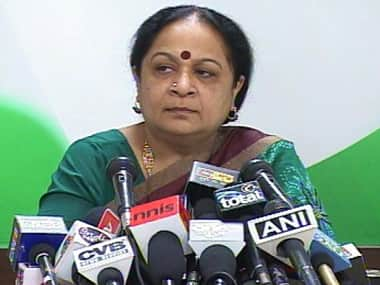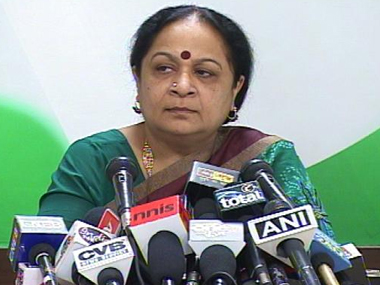What is Jayanthi Natarajan trying to tell us? Is she accusing Rahul Gandhi of corruption? Or, is she telling us that Rahul influenced decisions of the Manmohan Singh government but didn’t own them up? [caption id=“attachment_2072679” align=“alignleft” width=“380”]  Jayanthi Natarajan. Ibnlive[/caption] On the surface, Natarajan looks like a spurned loyalist who is angry; somebody who feels she was punished, defamed and vilified for following the party line, entertaining Rahul’s request and doing her job with honesty and utmost loyalty. But, she has hinted also at a deeper malaise in the erstwhile UPA government and infirmities in Rahul’s politics. Before she was removed from the ministry of environment and forests (MoEF), Jayanthi Natarajan had accumulated nearly 350 files on her desk. According to a report in the Economic Times, these files accumulated with Natarajan — 180 of them unsigned, 169 signed but still withheld — for reasons that the former minister did not share with the public. At a press conference on Friday (30 January) announcing her resignation from the Congress, Natarajan claimed it was her party’s policy to be cautious about giving environmental clearance to big-ticket projects. And that as a minister she used to get ‘requests’ from Rahul and his office for looking into objections raised by NGOs against some projects before clearing them. Finally, Natarajan claimed to have done nothing wrong, arguing that all her decisions — or rather her reluctance to take any decision on environmental clearance to projects — were meant to ensure that development doesn’t come at the cost of the environment. On the basis of what Natarajan said, Rahul is not guilty of graft. After all, you get paid for clearing a project or expediting it, not for delaying approval. So, if Rahul was asking Natarajan to be cautious about the environment, he was certainly not looking to collect what Narendra Modi called “Jayanthi tax”. Unless, of course, the stalled projects were later cleared in a hurry. But Rahul may have contributed a lot to the policy paralysis that brought down the UPA government. He may have been guilty of first stalling development and creating bottlenecks, of pursuing an ‘environment first’ policy and an ‘anti-vikas’ ideology, and then sacrificing it at the altar of politics. A part of the myth of Rahul’s hands-off approach was busted much before Natarajan’s allegations and insinuations. In September 2013, when Rahul shredded the government’s ordinance allowing convicted politicians to contest polls, called it ‘complete nonsense’, he clearly established who was running both the party and the government. Natarajan’s confession — that she managed to sit on files even when many in the government were not in favour of blocking projects — shows that Rahul’s will prevailed over others. It turns out, Rahul destroyed not just his party with his experiments but also ruined the government’s reputation by ensuring that his diktat — or ‘requests’ — get preference over objections by several other ministers. Of course, Natarajan’s allegations and her ‘letter bomb’ suggest that Rahul lacked the courage to hold on to his beliefs and ideology and own up his decisions. “The day after I resigned, Shri Rahul Gandhi addressed a FICCI meeting of industrialists, where he made uncomplimentary references to delays in environmental clearances, and the adverse effects upon the economy, and assured the corporate world, that the party and government would henceforth ensure that there would be no delays, and bottlenecks for industry," Natarajan said. It seems, Rahul found it hard to justify his party’s policy of withholding clearances and blocking investments when the narrative of the 2014 election started to build about development and achche din. Instead of explaining his stance, standing firmly by his ‘environment first, development later’ ideology, he found it convenient to take a U-turn and blame Natarajan for obstructionism and economic obscurantism. We could have given Rahul the benefit of doubt. The timing of Natarajan’s attack, reports that she met Amit Shah before speaking up against Rahul, was accused by the BJP of graft, appeared apologetic about speaking up on ‘snoopgate’ and invoked the names of Adani and Vedanta suggest that the former minister is getting ready for a new innings. It seems she is cleaning her slate of her past and the allegations she made against Modi. Yet, it doesn’t absolve Rahul of some of the charges. What Rahul did to Natarajan is strikingly similar to his attempt at polishing his image, appearing holier than thou by tearing up the ordinance on convicted politicians at the cost of the PM’s image and integrity. So, it is difficult not to believe Natarajan when she blames Rahul for political chicanery and opportunism. But is he guilty of graft or crony capitalism? We will have to wait for results of the enquiry promised by Prakash Javadekar into environmental clearances during the UPA regime. It would, however, be interesting to see what happens to the enquiry and Modi’s allegations of a Jayanthi tax if Natarajan goes ahead and joins the BJP.
What Rahul Gandhi did to Jayanthi Natarajan is strikingly similar to his attempt at polishing his image, appearing holier than thou by tearing up the ordinance on convicted politicians at the cost of the PM’s image and integrity.
Advertisement
End of Article


)
)
)
)
)
)
)
)
)



